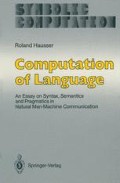Abstract
This book presented a formal theory of possible continuations, and applied it to the analysis of natural language. Incorporating possible continuations into natural language analysis required extensions and revisions of current linguistic, computational and philosophical theory of natural language, which were described in Parts I, II, and III, respectively.
Access this chapter
Tax calculation will be finalised at checkout
Purchases are for personal use only
References
Cf. Hausser (1986).
Constituent-structure analysis, for example, requires transformations and/or feature components to handle discontinuous constituents. A categorial grammar approach based on functor-argument structures, on the other hand, either generates an enormous number of equivalent derivations (e.g., Lambek (1958), Geach (1972)), or constrains the combinatorics at the cost of high lexical ambiguity (Hausser 1984a). Semantically motivated approaches to motivating (or constraining) syntactic composition also necessitate postulation of zero-surfaces or “traces.”
Author information
Authors and Affiliations
Rights and permissions
Copyright information
© 1989 Springer-Verlag Berlin Heidelberg
About this chapter
Cite this chapter
Hausser, R. (1989). Conclusion. In: Computation of Language. Symbolic Computation. Springer, Berlin, Heidelberg. https://doi.org/10.1007/978-3-642-74564-5_17
Download citation
DOI: https://doi.org/10.1007/978-3-642-74564-5_17
Publisher Name: Springer, Berlin, Heidelberg
Print ISBN: 978-3-642-74566-9
Online ISBN: 978-3-642-74564-5
eBook Packages: Springer Book Archive

